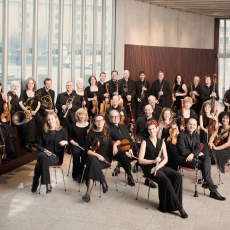Berlioz Symphonie Fantastique - SCO & Ticciati - InfoDad.com
Even well-worn symphonic paths can take new twists and turns in the hands of conductors unencumbered by a belief that performances have always been done a certain way and must therefore continue to be done that way. Berlioz’ Symphonie Fantastique invites performance by a large orchestra, for example, but 29-year-old Robin Ticciati tackles it with the Scottish Chamber Orchestra, of which he has been Principal Conductor since the 2009-10 season. This is scarcely a tiny orchestra – it has more than 60 players – but it is not the 90-to-100-member behemoth more often heard performing this work. The results are refreshing. Inner voices come through much more clearly than usual, woodwinds and especially brass attain prominence against the strings beyond what is usually heard, and the reading as a whole has a transparency and lightness that is unfamiliar in this well-known and still-fascinating work. The smaller orchestral size works particularly well in the first three movements, and Ticciati’s willingness to take chances – in making parts of Un balgenuinely frenetic, for example – pays high dividends. The extended introduction to the first movement proves a very meaningful scene-setter, establishing the dreamlike atmosphere that pervades the entire symphony, while the thunder in the concluding bars of theScène aux champs nicely anticipates the drama to come in the Marche au supplice. That movement and the finale, though, show the limitations of this chamber-music performance: neither has the weight and drama that it should, and it would have been better if Ticciati had conducted the finale with greater abandon, a higher sense of drama and some more-perverse snarls and sarcasm in the appropriate instruments – the whole thing is a touch too urbane. Nevertheless, this is an excellent reading in most ways, revealing details of Berlioz’ wonderful orchestration that are not always apparent and showing that even a piece as often played as this one can still have a fresh feeling in the right hands. Ticciati couples the symphony with the Béatrice et Bénédict overture, which skips along lightly and features more lovely details of orchestration, although here too a little greater sense of fun and abandon would have been welcome. It is almost as if this youthful conductor is holding himself back from being too high-spirited.


